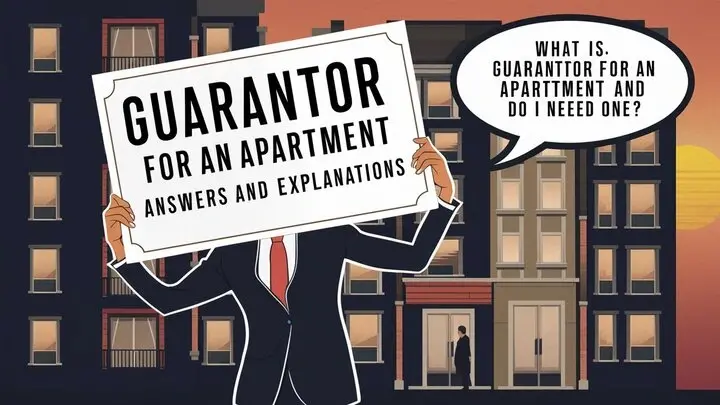-
Posted on: 28 Jun 2024

-
Sometimes you may come across certain rent-let-out apartments where you are expected to furnish a guarantee. Therefore, what is a guarantor's genuine intention, and when and where should one be turned in? Everything you need to know about guarantors for apartment rentals is broken down here:
Definition of a Guarantor
In case the renter is unable to pay the rent as expected, a guarantor—also known as a co-signer—is someone ready to sign a legal instrument rendering him or her legally and financially liable for the rent. Stated differently, the security deposit guarantees both the payments to the landlord and the expenses the tenant will be liable for should the renter default in pay-off of rent or violate other terms and conditions of the lease agreement.
Sometimes a guarantor helps to sign the rental lease with the renting renter. Signing means they consent to rent the unit and share equal liability for the rental as the renter occupying it. All that they are guaranteeing is other required actions followed and monthly rent paid in advance. Still, it falls on the guarantor in any scenario.
That leads us here to explore when a guarantor is needed.
While it is not a standard practice to demand a guarantee from prospective tenants, certain units do so in specific cases. Typical circumstances whereby a prospective renter would be required to provide a guarantee consist in:
The tenant either has a low credit history that is not favorable or a limited credit history overall. This can make landlords cautious as it is like having no credit history. This helps to relieve their worries about not being paid their rent by having a guarantee.
- The renter is unsteady financially; many landlords insist on evidence of a consistent income from recent pay stubs or a tax return. You have two choices to give some thought: You will need a guarantee whether your income is erratic or if you have gaps in employment, a low or unverifiable income level.
Young and inexperienced renters are likely to have a bad credit profile and no past rental history indicating their capacity to complete their commitments on time and the whole. The tenant is young and has no rental history. Since a young individual renting a residence will be held liable, a guarantor is always a wise option.
More tenants are covered by the lease; in situations where you wish other individuals to be let live in the house, the landlord may need you to name a guarantor to guarantee that they pay for the house as specified.
One of the most often asked issues regarding credit is who can be a guarantor for a loan. This is also crucial information to know.
Usually, close companions of the intended tenant and guarantors are acquaintances or family like parents or siblings. The most crucial factors defining a guarantor are:
Having high credit standing indicates that one is a good credit risk, that is, they can fulfill their responsibility to pay. High credit rating Most landlords say that guarantor credit ratings above 640 are acceptable, hence occasionally they land in the 700s.
Should the tenant's income be questioned, the guarantor's income is used as a promise that rent will be paid as due. Included in this conversation is a frequent type of identification that shows a person's income level—pay stubs or bank records.
Criminal records and any history of evictions are seen as forbidden; the lack of such records also provides the landlord trust.
Apart from family members, some additional people who could be qualified guarantors include:
Existing property owners, especially tenants without a credit history or record of renting past residences,
Bosses or companies – When they have a past relationship with an employee based on their behavior and interactions with them.
Such as caseworkers, those who get assistance with their rent or other housing expenses.Should I not have a guarantor, what happens?
Tenants who require a guarantor but do not know anyone who could cover for them still have some choices:
Certain businesses, such as Insurent, undertake to act as guarantors for a monthly fee paid by the renter. Should you fail to pay rent or honor any lease terms, it will be liable as a guarantor.
Like organizations like Rhino, you can choose to pay a monthly deposit instead of a normal, large security deposit. This saves money that might not be readily accessible to you should you want to pursue the degree personally.
Should your guarantor costs be denied, landlords may let you pay up to double or even triple the standard security deposit for the rental property.
Pay More Often: One obvious show of effort to pay is paying rent either bi-weekly or weekly instead of monthly.
Credit ratings: This section emphasizes how rapidly one can improve credit ratings before applying for apartments to reduce the possibility of being requested to provide a guarantor. Overcome credit mistakes and lower debt to raise your score.
Finding others to share the rental and sublet the rooms will help you to be sure of a backup to cover the rent should you run across some difficulties.
Are the guarantors difficult to get out of a lease?
Many people have worries about a guarantor including the possibility of being held liable long after the tenant has moved out. Fortunately, most ordinary leases terminate the guarantor's liability either:
1) At the end of every financial year, when the fixed rental period usually runs six months or twelve months.
OR.
2) Where the renter completely rejects the lease arrangement.
Consequently, the guarantor is free from shouldering the cost or any future harm should the initial term of the lease be ended or if the renter has gone through all the legal procedures allowing him or her to let go of rental obligations.
Generally speaking, it is advised to consult the specific contract you signed and take into account when and how to revoke a guarantor for lease commitments stated in the signed documentation. Ask the landlord or property management company also to make sure the guarantor is released from liability when the tenant properly leaves the apartment. Here is where obtaining official recorded agreements releasing the guarantor is vital.
The Balance Line
Therefore, in many locations where renting is growing, landlords have a pool of possible renters and can incorporate rigorous pre-approval policies including co-signer requirements.
Having some knowledge about what this role entails and what to do should assist in streamlining the apartment search process even if looking for a guarantor and getting him on board represents another step in the leasing process.
One should also take into account how one might leave a guarantor agreement as future changes in housing might call for this. In your contacts with your landlord, keep honest communication, codify agreements in writing, and make sure the lease leaves nothing to the imagination. These steps guarantee the comfort of the tenant and the guarantor needs to sign a tenancy with a co-signer.




